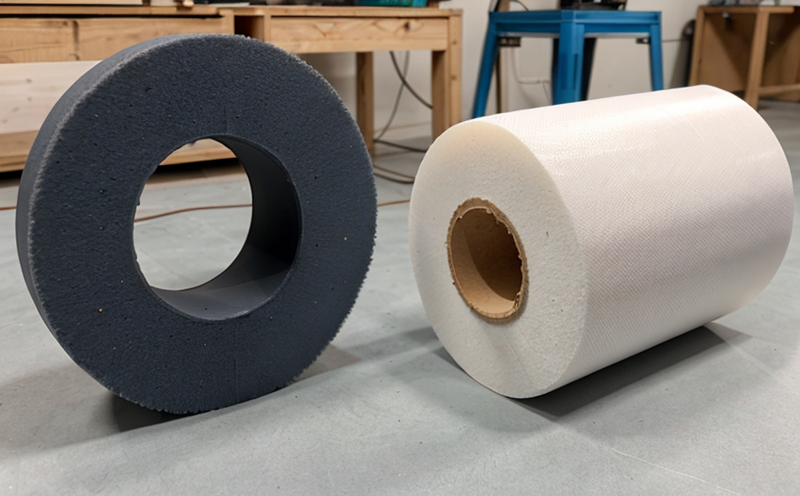ASTM D638 Tensile Testing of Plastic Furniture Components
The ASTM D638 standard is widely recognized as a key method for determining the tensile properties of plastics. In furniture manufacturing, especially when dealing with plastic components such as seats, backs, and frames, ensuring material quality is paramount to product durability, safety, and overall performance. This service focuses on the precise measurement of tensile strength and modulus using ASTM D638, providing critical insights into the mechanical integrity of plastic materials used in furniture.
For quality managers and compliance officers, ASTM D638 offers a robust framework for assessing material quality. By conducting this test, they can ensure that the plastic components meet industry standards and safety requirements, thereby minimizing potential risks associated with poor-quality materials. R&D engineers benefit from this testing as it helps them optimize their designs by understanding how different types of plastic will behave under stress.
During ASTM D638 tensile testing, a sample is pulled until it breaks or reaches its maximum load capacity. The amount of force applied and the distance over which it is applied are carefully controlled to ensure accurate results. This process helps identify any weaknesses within the material that could lead to premature failure during use.
In the context of furniture manufacturing, this test plays a crucial role in verifying that each component can withstand typical loads without deformation or fracture. For instance, if you're designing an office chair with a plastic seat insert, ASTM D638 would help determine whether the chosen material will support daily user weights safely and effectively.
Compliance officers also rely heavily on this testing to ensure their products comply with relevant regulations and standards set by bodies like the International Organization for Standardization (ISO) or American Society for Testing Materials (ASTM). By adhering strictly to these guidelines, manufacturers demonstrate their commitment to producing safe, reliable furniture while avoiding costly recalls due to non-compliance.
The precision of ASTM D638 ensures that even minor variations in material composition can be detected early on in the development process. This allows for timely adjustments before full-scale production begins, saving time and resources while enhancing product quality.
Furthermore, this testing provides a standardized method for comparing different materials or suppliers within your supply chain. It establishes common ground when discussing performance expectations with external parties such as vendors or customers.
The results from ASTM D638 tensile tests serve multiple purposes beyond just meeting regulatory requirements:
- Identify optimal material choices based on specific mechanical properties needed for various applications;
- Evaluate new formulations or modifications to existing materials;
- Determine the suitability of raw materials before they are integrated into final products;
- Assess long-term durability and reliability of plastic components over time.
In summary, ASTM D638 tensile testing is an essential tool for ensuring high-quality plastic furniture components. It contributes significantly to the overall success of a project by providing reliable data that supports informed decision-making throughout all stages of product development and manufacturing processes.
Benefits
- Promotes consistent quality across batches of materials;
- Aids in selecting superior suppliers by providing objective data on material performance;
- Reduces costs associated with rework or scrap by identifying problematic lots early;
- Enhances safety by ensuring that all components meet strict mechanical property requirements;
- Facilitates compliance with international standards, thereby broadening market access;
- Supports innovation through detailed insights into material characteristics and limitations.
International Acceptance and Recognition
The ASTM D638 standard enjoys widespread acceptance globally due to its rigorously established protocols. Many countries, including the United States, Canada, Australia, Europe, and parts of Asia, incorporate ASTM standards into their national codes. This international recognition underscores the importance of ASTM D638 in ensuring consistent quality across borders.
By following ASTM D638, manufacturers demonstrate their adherence to best practices recognized worldwide, which can be crucial for exporting products internationally or collaborating with global partners.
Use Cases and Application Examples
In practice, ASTM D638 is applied in various scenarios within furniture manufacturing. For example:
- Testing newly developed polymer blends to ensure they meet required performance criteria;
- Evaluating the durability of plastic seating inserts subjected to repeated loading cycles;
- Comparing different suppliers' offerings based on tensile strength data provided by ASTM D638 tests;
- Determining appropriate wall thicknesses for plastic components in outdoor furniture exposed to harsh weather conditions.
The detailed insights gained from ASTM D638 allow manufacturers to make informed decisions about material selection, design optimization, and process improvements. This ultimately leads to more robust, reliable, and safer furniture products.





